
Mark 12 is the twelfth chapter of the Gospel of Mark in the New Testament of the Christian Bible. It continues Jesus' teaching in the Temple in Jerusalem, and contains the parable of the Wicked Husbandmen, Jesus' argument with the Pharisees and Herodians over paying taxes to Caesar, and the debate with the Sadducees about the nature of people who will be resurrected at the end of time. It also contains Jesus' greatest commandment, his discussion of the messiah's relationship to King David, condemnation of the teachers of the law, and his praise of a poor widow's offering.

Matthew 3:1 is the first verse of the third chapter of the Gospel of Matthew in the New Testament. This verse takes up the narrative some thirty years after Matthew 2:23, beginning the account of Jesus' ministry. This verse introduces the figure of John the Baptist.

Matthew 4:1 is the first verse of the fourth chapter of the Gospel of Matthew in the New Testament. This verse opens the section in Matthew dealing with the temptation of Christ by Satan. Jesus has just been baptized by John the Baptist; in this verse he is led out into the wilderness.
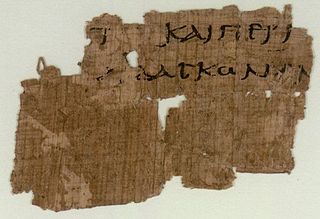
Matthew 4 is the fourth chapter of the Gospel of Matthew in the New Testament of Christian Bible. Many translations of the gospel and biblical commentaries separate the first section of chapter 4 from the remaining sections, which deal with Jesus' first public preaching and the gathering of his first disciples.

Matthew 4:3 is the third verse of the fourth chapter of the Gospel of Matthew in the New Testament. This verse opens the section in Matthew dealing with the temptation of Christ by Satan. Jesus has been fasting for forty days and forty nights, and in this verse the devil gives Christ his first temptation by encouraging him to use his powers to get food.
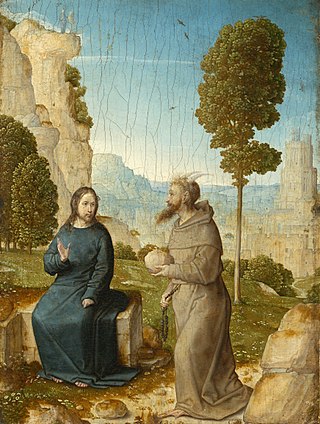
Matthew 4:4 is the fourth verse of the fourth chapter of the Gospel of Matthew in the New Testament. Jesus, who has been fasting in the desert, has just been tempted by Satan to make bread from stones to relieve his hunger, and in this verse he rejects this idea.

Matthew 4:5 is the fifth verse of the fourth chapter of the Gospel of Matthew in the New Testament. Jesus has just rebuffed Satan's first temptation, and in this verse the devil transports him to the site of the second temptation.

Matthew 4:6 is the sixth verse of the fourth chapter of the Gospel of Matthew in the New Testament. Jesus has just rebuffed "the tempter's" first temptation; in this verse, the devil presents Jesus with a second temptation while they are standing on the pinnacle of the temple in the "holy city" (Jerusalem).
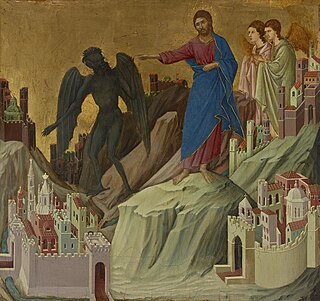
Matthew 4:8 is the eighth verse of the fourth chapter of the Gospel of Matthew in the New Testament. Jesus has just rejected Satan's second temptation. In this verse the devil transports Jesus to a new location for the third temptation.
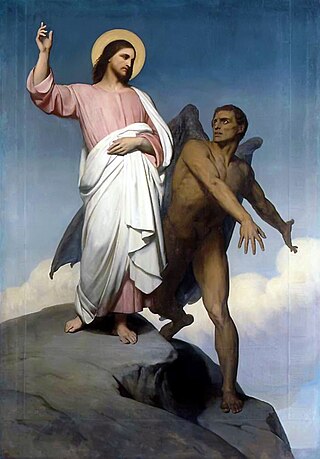
Matthew 4:9 is the ninth verse of the fourth chapter of the Gospel of Matthew in the New Testament. It is part of the Temptation of Christ narrative. Jesus has rebuffed two earlier temptations by Satan. In this verse, Satan offers control of the world to Jesus if he agrees to worship him.
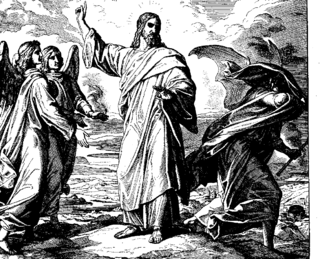
Matthew 4:10 is the tenth verse of the fourth chapter of the Gospel of Matthew in the New Testament. Jesus has rebuffed two earlier temptations by Satan. The devil has thus transported Jesus to the top of a great mountain and offered him control of the world to Jesus if he agrees to worship him. In this verse, Jesus rejects this temptation.

Matthew 4:11 is the eleventh verse of the fourth chapter of the Gospel of Matthew in the New Testament. Jesus has just rebuffed Satan's third temptation and ordered him away. In this last verse of the temptation scene, the devil departs and Jesus is serviced by angels.

Matthew 5:33 is the thirty-third verse of the fifth chapter of the Gospel of Matthew in the New Testament and is part of the Sermon on the Mount. This verse is the opening of the fourth antithesis, beginning the discussion of oaths.

The temptation of Christ is a biblical narrative detailed in the gospels of Matthew, Mark, and Luke. After being baptized by John the Baptist, Jesus was tempted by the devil after 40 days and nights of fasting in the Judaean Desert. At the time, Satan came to Jesus and tried to tempt him. Jesus having refused each temptation, Satan then departed and Jesus returned to Galilee to begin his ministry. During this entire time of spiritual battle, Jesus was fasting.

The Ten Commandments, or the Decalogue, are a set of biblical principles relating to ethics and worship that play a fundamental role in Judaism, Christianity, and Islam. The text of the Ten Commandments appears twice in the Bible: at Exodus 20:2–17 and Deuteronomy 5:6–21.

Luke 4 is the fourth chapter of the Gospel of Luke in the New Testament of the Christian Bible, traditionally attributed to Luke the Evangelist, a companion of Paul the Apostle on his missionary journeys. This chapter details Jesus' three temptations, the start of his "Galilean Ministry", and his rejection at Nazareth, which Luke contrasts with his acclaim in nearby Capernaum.

"Thou shalt not commit adultery" is found in the Book of Exodus of the Hebrew Bible. It is considered the sixth commandment by Roman Catholic and Lutheran authorities, but the seventh by Jewish and most Protestant authorities. What constitutes adultery is not plainly defined in this passage of the Bible, and has been the subject of debate within Judaism and Christianity. The word fornication means illicit sex, prostitution, idolatry and lawlessness.

"I am the LORD thy God" is the opening phrase of the Ten Commandments, which are widely understood as moral imperatives by ancient legal historians and Jewish and Christian biblical scholars.
Serpents are referred to in both the Hebrew Bible and the New Testament. The symbol of a serpent or snake played important roles in the religious traditions and cultural life of ancient Greece, Egypt, Mesopotamia, and Canaan. The serpent was a symbol of evil power and chaos from the underworld as well as a symbol of fertility, life, healing, and rebirth.
Seed of the woman or offspring of the woman is a phrase from the Book of Genesis: as a result of the serpent's temptation of Eve, which resulted in the fall of man, God announces that he will put an enmity between the seed of the serpent and the seed of the woman. In Christianity, this verse is known as the protoevangelium, and is interpreted as a prophecy of the coming of Jesus. In Judaism, the "seed of the woman" is taken as a collective reference to mankind in general.
















